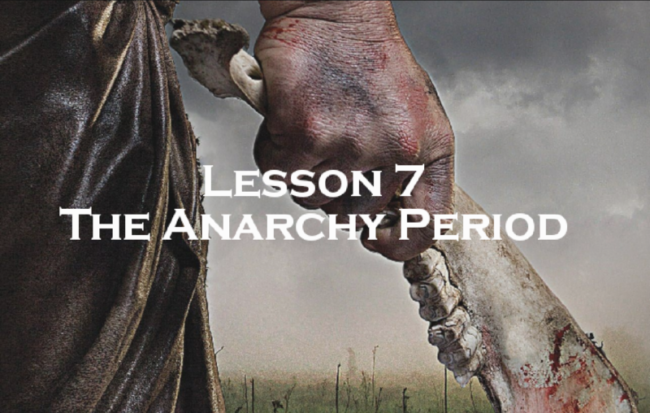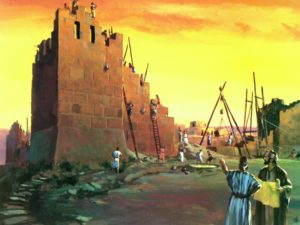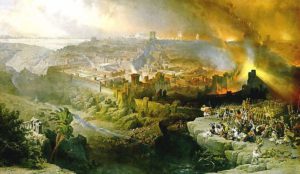Last week we introduced the Conquest Period. God made good on His promise to Abraham, Isaac, and Jacob (Israel). Israel conquered the land of Canaan in such a way that everyone knew there was a God in heaven. Lesson 7 focuses mainly on the book of Judges which describes the time immediately following the Conquest Period of Joshua’s day.
Introducing the Anarchy Period (Judges 3 – 1 Samuel 7)
![[Tags] gen-49-v-10-300x168 Lesson 7- What You Need to Know About the Anarchy Period](https://fiveminutebiblestudy.com/wp-content/uploads/2018/03/gen-49-v-10-300x168.jpg)
In Genesis 49:10, God said that from the offspring of Judah would emerge a king whom all the people would obey (see Lesson 3). Judah is the first one on the scene in Judges 1, but the king of promise has not come. The anarchy that ensues continues from Judges 3 to 1 Samuel 7. This period is punctuated by rape, homosexuality, idolatry, fornication, civil war, insurrection, murder, and other similar atrocities. This dark age in Israel’s history prepares the people with a thirsting hope for God appointed deliverance and leadership that only a king embodying the characteristics of Genesis 49:10 can quench.
How to Read the Anarchy Period
Judges proves a difficult read for anyone who fails to ask this question up front, “How did the author of Judges intend his book to be read?” The book lacks chronology as well as full disclosure of God’s opinion about character flaws within His self appointed judges. At least these two troubling issues have an easy answer: the Holy Spirit wanted Israel to read Judges and understand what NOT to do. The book of Judges is the troubleshooting guidebook for Israel. This glum piece of covenant history stands in glaring contrast to the glory God’s people experience when God reigns through the coming offspring of Judah. Judges masterfully details a three step process that starts with God’s people living in anarchy and ends at the threshold of a king restoring order in Israel.
1) No King is the Problem– Anarchy in Israel is announced four different times with the disclaimer, “There was no king in Israel,” (Judges 17:5; 18:1; 19:1; 21:25). As a result, “Everyone did what was right in his own eyes,” (Judges 17:5 & 21:25). While as a purely secular and heathen nation such as the United States does not see any horror in such an immoral state of affairs; Israel, a nation bound to God by covenant, was frequently reminded of the spiritual and physical consequences for rejecting God as their King. When God is King there is deliverance (Judges 2:16, 18; 3:9, 15; 10:11; 11:32; 15:18; 20:28). When God is King there is shouting and singing, not crying (Psalm 47). The physical lessons learned in the book of Judges were, in a backwards way, preparing Israel for the spiritual magnificence to come when God reigned through the righteous king from the tribe of Judah.
2) Tragedy is the Result– Grown men rarely cry, but in Judges they cry out seven times due to the distress brought on by their animalistic behavior (2:18, 3:9, 3:15, 4:3, 6:6, 10:10, 16:28). The book begins with Israel crying out from enemy oppression (2:18), and it ends with them grieving from the aftermath of civil war (21:15). This is a Greek tragedy turned Hebrew. Judges is even organized in such a way so as to realize this tragedy brought on by the progressive moral decline of Israel. The Holy Spirit does this by using a topical approach rather than a chronological approach. Two simple facts prove the absence of chronology. First, 300 years elapse between the Exodus and the time that Jephthah becomes judge of Israel (Judges 11:26). However, using the chronological method and counting up the rule of the other judges from 11:26 to the end of Samson’s rule in 16:31 equals a grand total of 436 years and would put Samson contemporaneous with King David (see 1 Kings 6:1). Thus, it cannot be chronological. Second, Moses’ grandson is alive in Judges 18:30. Moses’ grandson would have been long gone by Judges 18:30 if the book were chronological. Rather, Judges details one judge from each of the 12 tribes of Israel. The stories at the end are strategically placed out of chronology in order to show the progressive, tragic decline of the nation. Israel has gone from conquering Canaan (Judges 1) to crumbing underneath civil war (Judges 20). This is what happens when God’s people reject His rule.
3) Covenant Faithfulness is the Solution– The Angel of the Lord reminds Israel in Judges 2:1-6 that they have broken the covenant of Deuteronomy 27-29. The Deuteronomic covenant is simply the Sinai covenant renewed. The covenant carried with it the same laws of holiness. By introducing Judges with a reminder of this covenant, the Holy Spirit wants the reader to compare the events that follow with the holy laws of Deuteronomy. Here is a brief list of Deuteronomic laws and where they are broken within the Judges narrative
- Drive out Canaan’s native inhabitants (Deut. 7:2 / Judges 1:3-36)
- Destroy the Canaanite’s high places of worship (Deut. 12:3 / Judges 2:1-6)
- Deliberately teach each generation about the true God (Deut. 6:6-7 / Judges 2:7-12)
- Do not intermarry with the Canaanites (Deut. 7:3-4 / Judges 3:5-8)
- Do not do what is right in your own eyes (Deut. 12:8 / Judges 14:3)
These parallels are quite bold; though, Moses’ prediction in Deuteronomy 4:25-31 echoes out perhaps more boldly. He said Israel would very soon forsake God, be brought to ruin, call out in distress, return in obedience, and be blessed with the mercy of God. Covenant faithfulness was and is the solution.
Conclusion: So the story of Israel continues from Genesis to Judges. Physical anarchy taught Israel a hard lesson: they need a king, without a king they crumble, and the only solution is faithfulness to God’s covenant. With this Lesson 7, we get a little closer to understanding how that the seed of Eve will crush the head of Satan like Samson crushed the heads of 1,000 Philistines with the jawbone of a donkey (Judges 15). Again, we wait for a savior who, like Samson, will accomplish more in his death than He ever did in His life (Judges 16:30). Tune in next week as we analyze the Monarchy Period!
Resources– Right In Their Own Eyes by George Schwab



